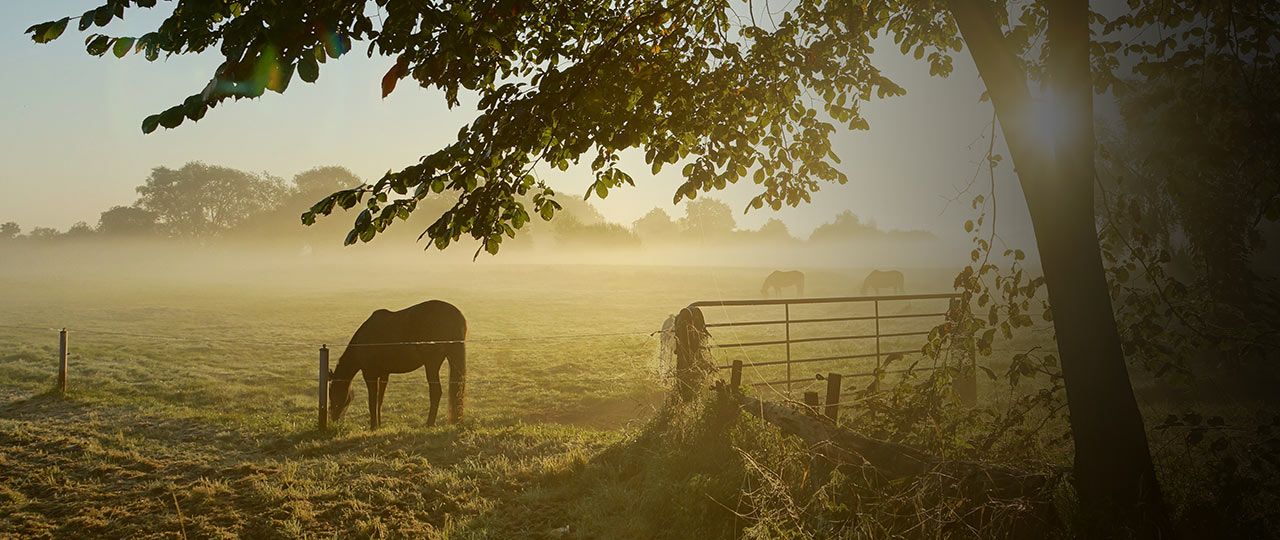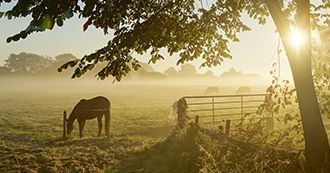
Love the idea of a country house but not sure what to do with the land that comes with it? We’ve got the answer…

Country homes typically come with a large garden, but some may also include several acres of land. If you’re not sure how to use fields or other land, read on to find out how you can generate additional income from letting out land.
What to consider before letting fields
Traditionally, small parcels of land might be rented to a local farmer or horse owner to use for grazing. This is a low-risk option which will generate a small amount of income. However, many landowners now see additional land as an opportunity to diversify and set up a side business. This is higher risk but may give you more profit.
Which route you choose to go down will depend on how much time, effort and money you want to put in. It’ll also be influenced by the geography of your letting fields. Large, flat, fertile fields with direct road access offer more possibilities than a couple of acres of rocky sloping ground tucked away behind your house.
Options for letting out land
1) Letting fields to a farmer
This is likely to be the simplest arrangement. For larger parcels of land, Strutt & Parker can assist with finding an interested party, but for small plots, your best bet may be to ask local farmers if they’re interested in some extra land.
It’s important to have a formal agreement drawn up by a professional. This could be an agricultural tenancy, a grazing licence or a Profit à Prendre agreement (a right of herbage or pasturage):
- Farm Business Tenancy – a tenancy grants the occupier exclusive use of the land for a set period.
- Grazing licence – this allows the occupier’s animals onto your land for the “grazing season” after which the licence ends (and the animals are removed from the land), avoiding the risk of a tenancy being created.
- Profit à Prendre/herbage agreement – you’re effectively selling the crop grown on your land (even if that’s being eaten by livestock throughout the year).
If you’re not familiar with the different types of agreement, it’s worth speaking to an expert as it may affect long-term use of the land and have inheritance tax implications. Rental prices will vary but you can typically earn around £90-110 per acre for grassland.
2) Letting out land to graze horses
This can be a profitable use particularly if your fields are too small to be of interest to farmers. You can earn around £350-400 per acre depending on location and facilities.
For small parcels of land, your best option is to let the fields to a single person, either under a grazing licence or common law tenancy. A tenancy allows you to place more obligations on the occupier, for example around fence repair, pulling ragwort and removal of droppings.
You’ll also need to stipulate that the land won’t be used for business use (this includes exercising horses) and may want the occupier to take out insurance so you’re not liable for damage or injury caused by the horses.
Land for grazing horses is often in high demand but there will need to be easy access to the fields, and you may struggle to let it if there’s no shelter, stabling or water on site. Field shelters on wheels are classed as temporary structures, but anything more permanent will require planning permission.
If you own an equestrian property and are looking to rent it out as a livery yard, you’ll need a different type of tenancy agreement that covers business use.
3) Let it grow wild
You may prefer to give some or all of your land back to nature to provide habitat for local wildlife. If you have a sizeable chunk of land, Natural England offers funding through the Countryside Stewardship scheme for environmental improvements, though money isn’t guaranteed.
4) Diversification
If you want to get more income from your land, there are plenty of more entrepreneurial options to consider. Most will require time, effort and some up-front costs, but they could yield much higher rewards.
Examples include:
- Letting fields for weddings, festivals, gymkhanas or shows
- Glamping or wild camping
- Solar or community energy projects
- Planting an orchard and selling fruit as “pick your own” or using it to make juice, cider or jam
- Letting out land as filming locations if you have an attractive backdrop
Make sure you think about the practicalities, particularly road access and parking, before committing time and money. If your property is listed, or you live in a conservation area, there may be restrictions on what you’re able to do.
